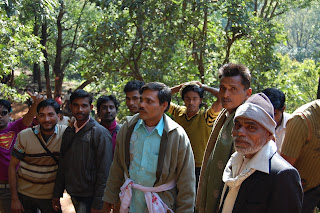Dolly and I went out to dinner one more time with Jonathan on the last night we would both be in town. We went to a vegetarian restaurant named Swad that we had heard good things about. We had not yet visited it because usually when we go out for dinner, we are going for chicken, so do not often visit strictly vegetarian establishments. However, we had eaten out 2 or 3 time in the past week, so we weren't as protein crazy.
The food started out good, the fries (called "finger chips") and spring rolls were enjoyable, and then after awhile the entrees came.
I have many allergies/food intolerences, among them a dairy allergy. My dish came out with a sprinkling of cheese on top, which is a common garnish. This has happened before, and I should know by now to ask that they not put it on. I scraped the cheese off, and noticed that there were cheese chunks throughout the sauce.
These chunks were too small and numerous to remove, so I ordered another dish, tawa vegetables. A tawa is a flat frying pan, so basically I was ordering stir fry vegetables. I asked specifically and multiple times for "no cheese, no paneer", and Dolly added "no cream". It is not enough to ask for no dairy products, as that is not a food grouping that is known here. I'm sure sure if you asked specifically about each product, people would know that it came from a cow, but you can't generalize under that description.
When my vegetables came out, there was the sprinkling of cheese on top. And on closer inspection, there was paneer in the dish. I called the waiter over, explained the difference in what I had asked for and what I had received, and he took the dish away. A few minutes later, the dish came back out, clearly the same food with the paneer chunks removed and some, but not all, of the cheese scraped from the top.
I pointed this out to him, and showed him that there were still cheese shavings, which he claimed were gobi (cauliflower) pieces. After I showed him it was clearly cheese, he told me it was not cheese, it was "decoration" (made of cheese). I started saying that I had ordered something clearly and specifically, and he had not brought it. In India, there isn't the concept of "sending a dish back," so I wanted to make it clear that I was not accepting this dish, as it was not what I ordered. I guess I was getting loud and/or angry, so Dolly took over. Eventually a manager came over and had the kitchen make something I could eat... by this time is was past 10 oclock, so I was very hungry.
Also, I saw a mouse running under some of the booths, but didn't mention it because Dolly would have freaked out. I don't think we'll be eating there again.
The food started out good, the fries (called "finger chips") and spring rolls were enjoyable, and then after awhile the entrees came.
I have many allergies/food intolerences, among them a dairy allergy. My dish came out with a sprinkling of cheese on top, which is a common garnish. This has happened before, and I should know by now to ask that they not put it on. I scraped the cheese off, and noticed that there were cheese chunks throughout the sauce.
These chunks were too small and numerous to remove, so I ordered another dish, tawa vegetables. A tawa is a flat frying pan, so basically I was ordering stir fry vegetables. I asked specifically and multiple times for "no cheese, no paneer", and Dolly added "no cream". It is not enough to ask for no dairy products, as that is not a food grouping that is known here. I'm sure sure if you asked specifically about each product, people would know that it came from a cow, but you can't generalize under that description.
When my vegetables came out, there was the sprinkling of cheese on top. And on closer inspection, there was paneer in the dish. I called the waiter over, explained the difference in what I had asked for and what I had received, and he took the dish away. A few minutes later, the dish came back out, clearly the same food with the paneer chunks removed and some, but not all, of the cheese scraped from the top.
I pointed this out to him, and showed him that there were still cheese shavings, which he claimed were gobi (cauliflower) pieces. After I showed him it was clearly cheese, he told me it was not cheese, it was "decoration" (made of cheese). I started saying that I had ordered something clearly and specifically, and he had not brought it. In India, there isn't the concept of "sending a dish back," so I wanted to make it clear that I was not accepting this dish, as it was not what I ordered. I guess I was getting loud and/or angry, so Dolly took over. Eventually a manager came over and had the kitchen make something I could eat... by this time is was past 10 oclock, so I was very hungry.
Also, I saw a mouse running under some of the booths, but didn't mention it because Dolly would have freaked out. I don't think we'll be eating there again.

